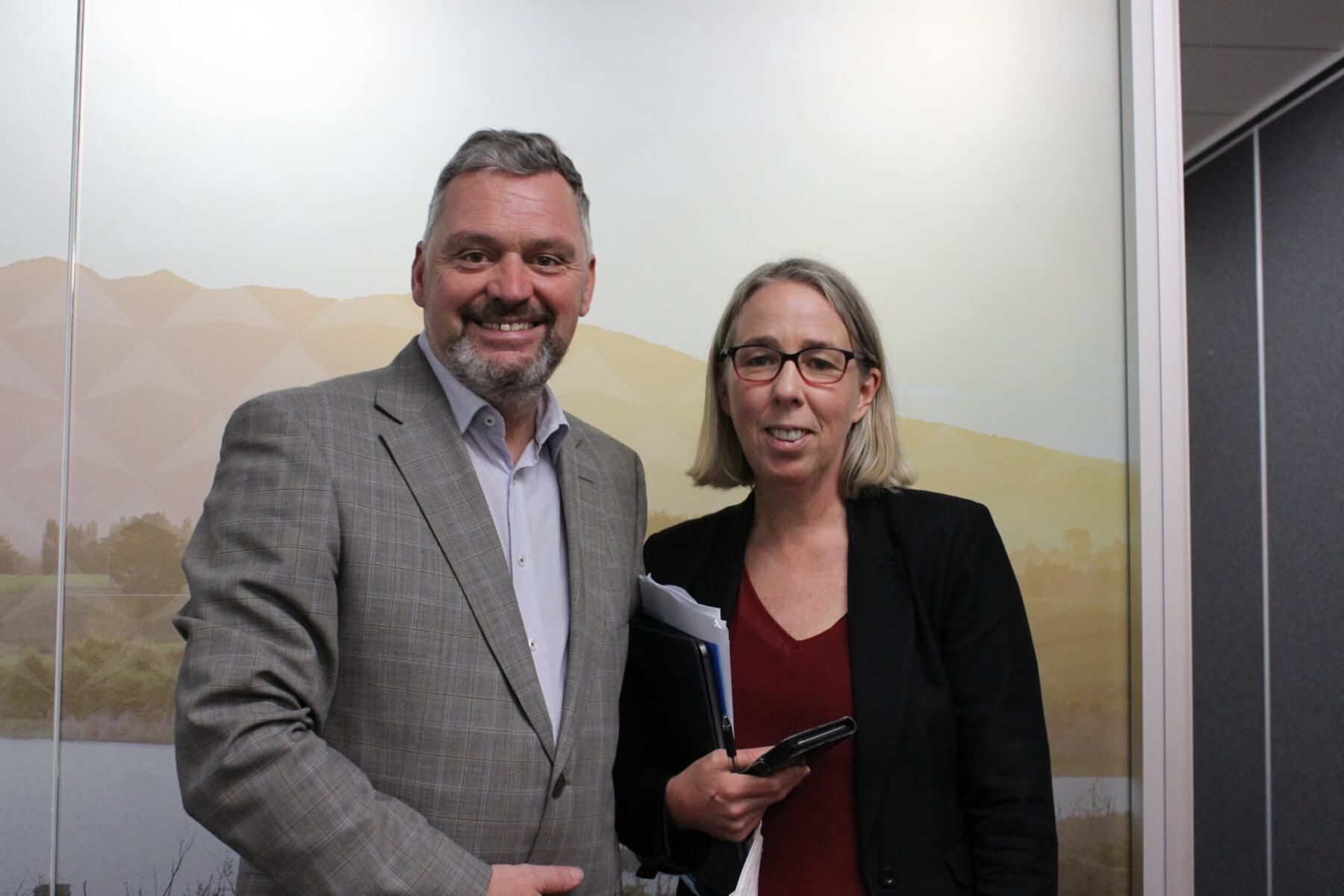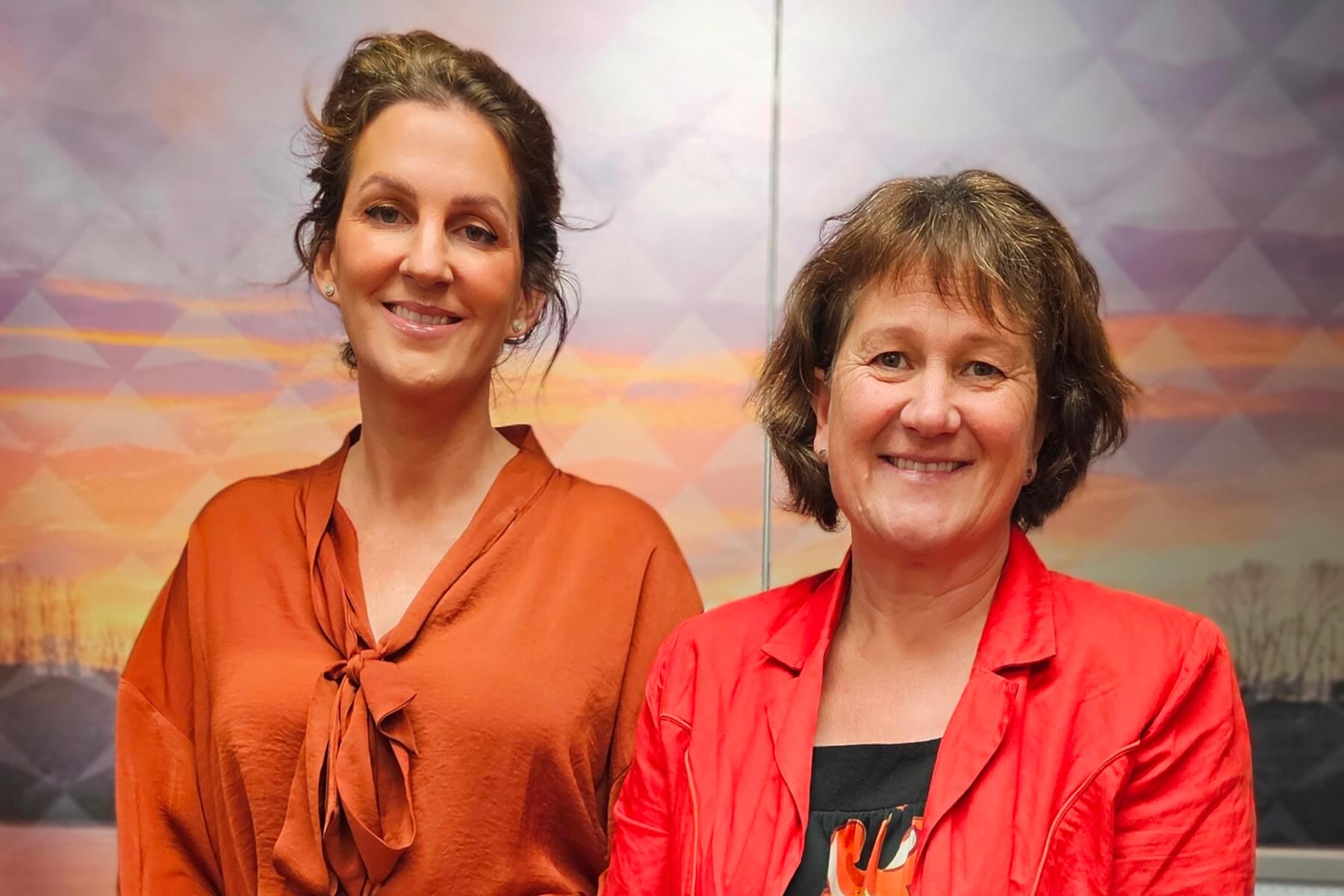Community board chairs Ange Holt and Jo Davies-Colley have been brutally honest in an assessment of their own performances tabled in a paper to Waipā councillors this week.
It has been a chaotic six months for both community boards with Holt getting offside with councillors and staff over plans for Te Awamutu Memorial Park and Davies-Colley stepping up when the Cambridge Connections “Blue Blob” debacle over the placement of a third bridge corridor through a Cambridge suburb turned to custard.

Consultant Steven Finlay with Governance manager Jo Gread when he presented his community board recommendations to the council nearly two years ago. Photo: Mary Anne Gill.
But a review of community boards’ role predated all this when the council adopted in July 2022 the recommendations of Equip Consultancy’s Steven Finlay to make community boards function better and be more relevant.
This followed attempts by the previous council to get rid of the community boards.
Holt took “full responsibility” for her style and tone around issues such as the Memorial Park stoush while Davies-Colley said she recognised the need to build relationships in the community so the board could be better advocates.
A report card presented to the council’s Strategic Planning and Policy committee this week was the first opportunity to see how community boards are faring and set them 24-month goals. Te Awamutu got a 40 per cent pass mark while Cambridge attained 60 per cent.
Similar assessments are not required of councillors but if they were Waipā residents might say the council elected representatives themselves “could do better”.
The paper does say councillors on community boards – Mike Montgomerie and Philip Coles at Cambridge; Bruce Thomas and Lou Brown at Te Awamutu-Kihikihi – should up their game and take better opportunities to update community board members at meetings.
- Bruce Thomas
- Lou Brown
Governance manager Jo Gread told the committee there were genuine opportunities “but also very real concerns” which warranted specific recommendations and support for the community boards.
The harshest criticism came from Holt whose comments prompted staff to publish responses alongside her monthly chair’s report.
“Finding our way is still taking time. We are struggling to get things right and this is causing conflict,” Holt said.
“We are raising issues that our community are raising, like fluoridation, the proposed incinerator, heritage signs, Holmes Garage and questioning levels of service. The continual push back is incredibly frustrating.
“We are frustrated that one of the most important issues for us from the first review was to have our input from the community put forward at the point in the process where it could make a difference and yet again we are at the tail end where we will just make a submission to an Annual Plan and Long Term Plan that has already been largely decided. they could do better following weeks of criticism,” she said.
Finlay’s November update to the council on the boards’ progress was considered in a behind closed doors workshop and was released for the first time this week.
He noted the Te Awamutu-Kihikihi board “urgently” needed mentoring and training on mitigating the flow on issues and consequences from the Memorial Park debate.
Opposition to the proposals has been a constant thorn in the council’s side since March 2020 when the first draft put forward plans for heritage features including the pond, the gateways and the Peace Fountain. Holt’s opposition has at times been vehement.
The council brought in Linda Hutchings, a Waikato trainer and mentor, to work with Holt.
The leadership training was “valuable and supported my interpretation of the various situations I have found myself in,” said Holt.
“Issues of ‘style and tone’ especially in written and verbal communications by Te Awamutu Community Board are clouding genuine progress, and the gains that are underway,” said Finlay and the Memorial Park issue was damaging trust in the board.
Support from staff was “fragile” due to risks to staff safety and wellbeing, he said.
“Staff also report being closely monitored by community members in Memorial Park. This is unacceptable, and although not the direct responsibility of the community board, is potentially a consequence of tacit or explicit approval of the anti-council sentiment being expressed by specific members of the public at board meetings,” said Finlay.
“It is a worrying trend that throughout New Zealand frontline council officers are subjected to more abuse than at any other time, while trying to diligently serve the public as neutral council officers and staff.”
Holt accepted the recommendations and said she looked forward to the next six months by trying to be “solution focused”.

Community board chairs Jo Davies-Colley (Cambridge), left, and Ange Holt (Te Awamutu & Kihikihi), right before this week’s meeting about their performances. Photo: Mary Anne Gill.











